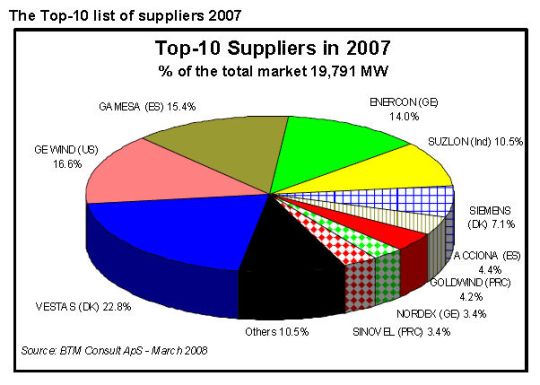Conservative presidential candidate Sen. John McCain chose a clever but ultimately hypocritical location for his big climate speech. I hope the media aren’t fooled by his ironic choice of wind turbine company Vestas as the backdrop, but I have little doubt they will run enticing photos and videos of wind turbines. McCain, however, does not deserve to be linked to such images.
I would title the speech “Not the man for the job” (see “No climate for old men“).
Let’s be clear: Conservatives like John McCain, or more accurately, conservatives including John McCain, are the main reason McCain has to go to a Danish wind turbine manufacturer to give a climate speech. With the major government investments in wind in the 1970s, the United States was poised to be a dominant player in what was clearly going to be one of the biggest job-creating industries of the next hundred years. But conservatives repeatedly gutted the wind budget, then opposed efforts by progressives to increase it, and repeatedly blocked efforts to extend the wind power tax credit. The sad result can be seen here:

That’s right. The United States is now a bit player in an industry we launched (we had 90 percent of global installed capacity in the mid-1980s) — thanks to conservatives, including McCain.
In December, McCain himself failed to show up for a key vote that would have extended the wind power production tax credit, which has been a key driver of wind power in this country — allowing it to compete with our better-subsidized power sources (like nuclear) in this country, and to partly offset the much bigger subsidies other countries have for renewables. The vote would have shifted money from subsidies to the oil industry, which hardly needs it given record oil prices and record oil profits (see “How high must oil go before we end subsidies?“)
McCain’s vote could have broken the conservative filibuster blocking the effort to support renewables, since the clean energy tax package failed 59-40, but his spokesperson said that “he would not have supported breaking the filibuster.” This was but one recent example of a series of missed votes or anti-renewable votes McCain has cast in recent years.
As the Center for American Progress documented, McCain has repeatedly opposed a renewable electricity standard that would have set a minimum requirement for utilities to generate part of their power from sources like wind. Half the states have such requirements, a key reason the industry has not died out entirely in this country. Most European countries have such requirements, a key reason their countries had become leaders. Where was McCain:
In 2002 and 2005, there were votes in the Senate to require utilities nationwide to generate 10 percent or 20 percent of their electricity from renewable energy resources. Sen. McCain voted against renewable electricity every time.
- 2005: Voted against a renewable portfolio standard
- 2002: Voted against 20 percent requirement
- 2002 (Vote 55): Voted to gut 10 percent requirement
- 2002 (Vote 59): voted to gut 10 percent requirement
McCain opposed subsides for wind power, as he told Grist in October:
Grist: What’s your position on subsidies for green technologies like wind and solar?
McCain: I’m not one who believes that we need to subsidize things. The wind industry is doing fine, the solar industry is doing fine. In the ’70s, we gave too many subsidies and too much help, and we had substandard products sold to the American people, which then made them disenchanted with solar for a long time.
Seriously! Subsidies for the oil industry are fine, though. And for nuclear, too. The wind industry is about 1 percent of U.S. electricity. The nuclear industry is 20 percent. But McCain supports further subsidies for nuclear power, which has already received nearly $100 billion in direct and indirect subsidies (see “Nuclear pork — enough is enough“), so this country can be like the French and get 80 percent of all our power from nukes, which would require building probably 500 to 700 more (see “McCain calls for 700+ new nuclear plants costing $4 trillion“). He repeated his praise of the French nuclear strategy in his talk.
One final point: McCain is merely acting in the consistent tradition of recent conservatives. President Reagan cut the renewable energy R&D budget 85 percent after he took office and eliminated the wind investment tax credit in 1986. This was pretty much the death of most of the U.S. wind industry. While President Clinton worked to increase funding for wind, the Gingrich Congress blocked that effort beginning in 1995. President Bush is another conservative who fails to see the importance of wind power in the need for consistent support of the tax credit.
So the end result is McCain delivering his big climate talk at a foreign wind manufacturer. If McCain becomes president, we will take modest but inadequate action on global warming (as his speech makes clear), but the job-creating clean technologies we will be using to fight climate change will primarily be coming from other countries.
This post was created for ClimateProgress.org, a project of the Center for American Progress Action Fund.

